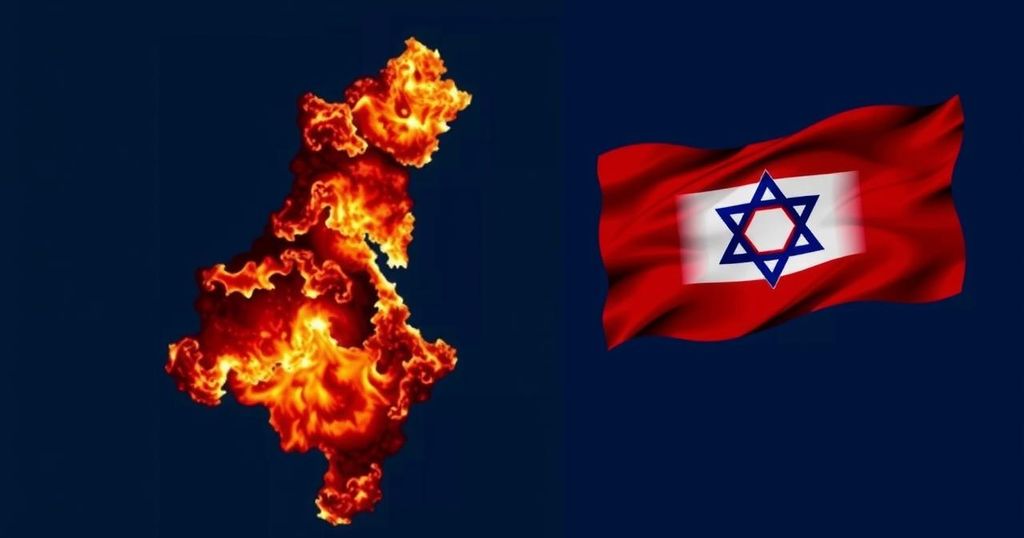Iran Issues Stark Warning to Israel Amid Escalating Regional Tensions

Iran’s Revolutionary Guards commander warned Israel of severe retaliation should it attack Iran following a missile barrage, as Israeli military operations against Hezbollah escalate in Lebanon. Diplomatic efforts continue, yet the conflict shows no signs of abating, resulting in substantial casualties and displacements in both Lebanon and Gaza.
On Thursday, the commander of Iran’s Revolutionary Guards issued a stark warning to Israel, cautioning that any aggressive actions against Iran in response to recent missile attacks would provoke a severe retaliation. This warning coincided with Israel intensifying its military operations against Hezbollah in Lebanon, following a missile barrage reportedly orchestrated by Iran on October 1, as a counter-move to Israeli airstrikes on Iranian-aligned militants. Iran’s commander, Hossein Salami, emphasized that any Israeli aggression would be met with corresponding strikes, asserting that Iran possesses the capability to breach Israeli defenses. In the backdrop of rising tensions, U.S. Defense Secretary Lloyd Austin engaged in discussions with Israeli Defense Minister Yoav Gallant regarding the military situation in Lebanon and Gaza, in an effort to prevent a broader regional conflict. Concurrently, Iranian foreign relations were highlighted through Foreign Minister Abbas Araqchi’s tour of the Middle East, during which he met with Egyptian President Abdel Fattah al-Sisi, who reiterated the importance of avoiding further escalation. Despite these diplomatic efforts, Israel has remained steadfast in its military campaign against Hezbollah, eliminating key leaders of the group and targeting Hamas in Gaza with ominous intent to respond decisively to Iran’s provocations. In addition to the violence in Lebanon and Gaza, Israeli airstrikes recently targeted facilities within Syria and across regions controlled by Iranian-aligned Houthis in Yemen. The operational impact of Israeli military actions has been devastating, with reports confirming approximately 2,350 fatalities in Lebanon over the past year and sizable displacements affecting over 1.2 million individuals. From the Israeli perspective, the toll includes around 50 casualties among both soldiers and civilians. Furthermore, evacuation orders were issued for specific regions in Lebanon, signaling ongoing military strategy prioritizing both safety and tactical advantage. Hezbollah’s official Hassan Fadlallah articulated the group’s resolve to continue its resistance while maintaining coordination for potential ceasefire discussions with Lebanese parliamentary leaders. The armed group remains engaged in the conflict despite suffering losses from Israeli offensives, prompting heightened warnings from the Israeli military regarding upcoming operations. As the violence persists, the residents of Lebanon, including displaced individuals like Abdelnaser from Beirut, reflect on the cyclical nature of conflict and its pervasive effects on their lives, stating with lament, “War has become normal for us. We know that every 10 years Lebanon gets built, and every 10 years it gets destroyed again.”
The ongoing tensions between Iran, Israel, and Hezbollah represent a complex and precarious situation in the Middle East. Iran’s support for Hezbollah and Hamas has fostered a climate of hostility, with Israel responding aggressively to perceived threats. The situation has escalated following recent missile attacks and military operations, risking wider regional implications. Understanding the historical context of these conflicts, along with the strategic interests of the involved parties, is crucial to appreciating the gravity of the current circumstances and their potential ramifications.
In conclusion, the deteriorating situation in the Middle East, highlighted by the threats between Iran and Israel and the intensified military operations against Hezbollah, underscores a volatile landscape. Diplomatic efforts to mitigate conflict continue but are overshadowed by the realities of ongoing violence and retaliatory cycles. The casualties and displacements inflicted upon civilians emphasize the urgent need for resolution, as the region grapples with the relentless cycle of warfare and rebuilding.
Original Source: www.jpost.com








